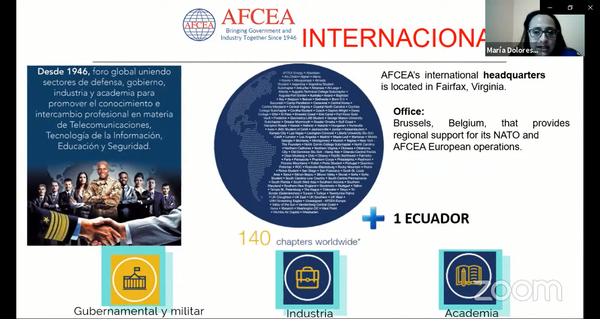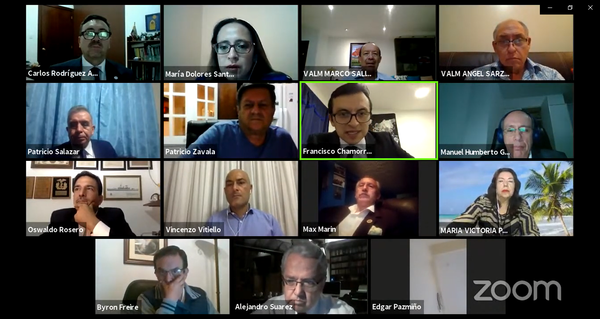In August, the chapter held one of its first official events, featuring presentations on the uses of satellites as efficient means for the protection of marine resources. The meeting began with introductions from María Dolores Santos Vidal, chapter president, who welcomed all those present, explained AFCEA International's mission and its global representation, mentioned the chapter's connection with the Rome, Silicon Valley and Argentina Chapters, informed the audience about SIGNAL Magazine and SIGNAL Media, and commented about Women in AFCEA, Young AFCEANs and AFCEA's Educational Foundation. She also explained the categories of membership-individual, corporate, student or military/government-and detailed the benefits of becoming a member of AFCEA. The chapter's inaugural event in June launched with 40 active members composed of eight women and 32 men.
Attendees and participants included Ambassador Alejandro Suárez, director of the Academia Diplomática; Carlos Rodríguez Arrieta, first chapter vice president, former dean of the Universidad de las Fuerzas Armadas (ESPE), former chief of staff, operational major of the Joint Command; Air Force Col. Patricio Salazar (Ret.), second chapter vice president, former director of the Instituto Espacial Ecuatoriano and an expert in satellite systems; Oswaldo Rosero, expert consultant on satellite systems relating to the topic of fisheries; and Fleet Capt. Humberto Gómez (Ret.), former director of INOCAR and former director of the Dirección General de Intereses Marítimos. Francisco Chamorro, professor at the Instituto de Altos Estudios Nacionales, IAEN, and an expert in issues relating to security and defense, moderated the discussion.
During the event, presenters discussed CONVEMAR and its maritime resources; the judicial, diplomatic and technological mechanisms available for a sustainable process of marine resources; the use of satellites and implications in the security and defense of a coastal state; the use of satellites as suitable tools for the protection of sea resources; and the state-of-the-art use of satellites within the region for the sustainable use of marine resources.
CONVEMAR advocates for the conservation and sustainable use of living and nonliving resources that are found in marine spaces in the coastal states. However, turning proposals into reality is an effort that the coastal states must carry out in all pertinent areas, including judicial, diplomatic and technological, which represents a challenge to the state structure and the private sector.
One efficient tool is the use of satellite platforms. However, its uses are not completely understood and neither are the resources required for its application. On the other hand, the use of satellite platforms for the conservation of living resources has some implications for the security and defense of the sovereignty of states, which must be promptly identified. This leads us to verify its efficiency at a regional level from its use by other coastal states and to possibly identify some aspects relating to defense, security and protection that may be applied to conservation and the sustainable use of marine resources.an effort that the coastal states must carry out in all pertinent areas, which include judicial, diplomatic and technological, representing a challenge to the state structure and a commitment that must include the private sector.
One of the technologies that shines as an efficient tool is the use of the satellite platforms. However, its uses are not completely understood and neither are the resources required for its application.
On the other hand, the use of satellite platforms for the conservation of living resources has some implications on the security and defense of the sovereignty of states, which must be promptly identified. This leads us to verify its efficiency at a regional level from its use by other coastal states and to possibly identify some aspects relating to defense, security and protection that they may be applying in the areas of conservation and the sustainable usage of marine resources.
|

Presenters at the August event are (l-r) Francisco Chamarro, professor at the Instituto de Altos Estudios Nacionales, IAEN; María Dolores Santos Vidal, chapter president; Ambassador Alejandro Suárez, director of the Academia Diplomática; Carlos Rodríguez Arrieta, first chapter vice president, former dean of the Universidad de las Fuerzas Armadas (ESPE), former chief of staff, operational major of the Joint Command; Air Force Col. Patricio Salazar (Ret.), second chapter vice president, former director of the Instituto Espacial Ecuatoriano; Fleet Capt. Humberto Gómez (Ret.), former director of INOCAR and former director of the Dirección General de Intereses Marítimos; and Oswaldo Rosero, maritime domain management specialist. |





